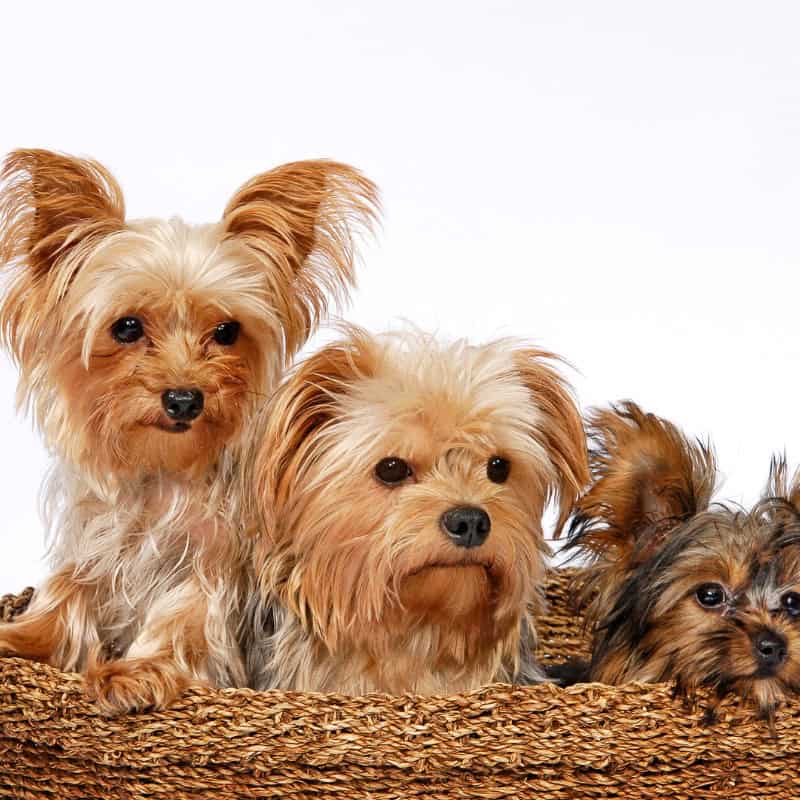Blog
Yorkshire Terrier Size: How Big Do they Get?

If you’ve ever fallen in love with a Yorkshire Terrier, you’re probably familiar with their tiny size and huge personality. But just how small are they supposed to be? This guide will help you discover what is the ideal Yorkshire terrier size and whether you should be worried if your pup gained some excessive weight.

Yorkshire Terrier Size: How Big Should a Yorkshire Terrier Be?
The American Kennel Club (AKC) standard for Yorkshire Terriers states that these tiny companions should not exceed 7 pounds (3.17 kg). However, in the real world, Yorkie sizes vary more than the standard might suggest. Many Yorkshire Terriers fall between 4 to 8 pounds (1.81 to 3.63 kg), and around 21% of Yorkies even exceed 8 pounds once they reach adulthood.
This variation can be surprising to owners who expected their Yorkie to stay small, but it’s not uncommon. Genetics, diet, and the dog’s growth patterns can all play a role in how large or small your Yorkshire Terrier becomes.
Yorkie Growth Progression: What to Expect
Like all dogs, Yorkshire Terriers go through predictable growth stages, though their small size makes these changes less obvious.
- 0–12 Months: Yorkies experience rapid growth during the first 9 to 12 months. During this phase, they go from tiny puppies to nearly their full adult size.
- 12–15 Months: Some Yorkies may continue to fill out slightly during this period, but most will have reached their final size by 12 months.
- After 15 Months: If your Yorkie continues to grow or gain weight past this point, it might be worth checking with your vet. This could indicate changes in diet, metabolism, or other health concerns.
Following a yorkie growth chart can help you keep track of your pup’s development and ensure they’re hitting healthy milestones along the way.
Why Is My Yorkie So Big? What’s the Ideal Yorkshire Terrier Size?
If your Yorkie has grown larger than expected, you’re not alone. A common question among Yorkie owners is: “Why is my yorkie so big?” Although the AKC’s standard emphasizes small sizes, many Yorkies naturally exceed the 7-pound guideline without any health issues. Here are some possible reasons your Yorkie might be on the larger side:
- Genetics: Your Yorkie’s parents or grandparents may have passed down larger genes, resulting in a slightly bigger dog.
- Diet and Exercise: Overfeeding or limited physical activity can lead to weight gain. Make sure to monitor portion sizes and give your Yorkie daily exercise.
- Mixed Ancestry: Some Yorkies might not be 100% purebred, and a mix with other small breeds could result in a slightly larger size.
- Healthy Variation: Just like people, dogs come in all shapes and sizes. A larger Yorkie can still be healthy and live a full, happy life.
If your Yorkie’s size seems unusual or you’re concerned about rapid weight gain, consult your vet to rule out underlying issues.

Yorkshire Terrier Size and Other Toy Breeds
When it comes to toy breeds, size is often a defining characteristic. So, how does the Yorkshire Terrier stack up against other small dog breeds? Let’s explore the key size differences between Yorkies and some of the most popular members of the toy breed group.
Toy Breed Size Comparison: Yorkie vs. Chihuahua, Pomeranian, Shih Tzu, and More
Below is a side-by-side look at the American Kennel Club (AKC) standard sizes for Yorkshire Terriers and other toy breeds. Height measurements are taken from the ground to the top of the shoulders (withers), giving a clear idea of how these petite pups compare.
- Chihuahua
- Weight: Up to 6 lbs
- Height: 6–9 inches
- Yorkshire Terrier
- Weight: Up to 7 lbs
- Height: 6–9 inches
- Pomeranian
- Weight: 3–7 lbs
- Height: 7–12 inches
- Shih Tzu
- Weight: 9–16 lbs
- Height: 9–11 inches
- Pug
- Weight: 14–18 lbs
- Height: 12–14 inches
- Papillon
- Weight: 5–10 lbs
- Height: 8–11 inches
- Havanese
- Weight: 7–13 lbs
- Height: 8.5–11.5 inches
- Brussels Griffon
- Weight: 8–10 lbs
- Height: 7–10 inches
- Pekingese
- Weight: Up to 14 lbs
- Height: 7–10 inches
- Japanese Chin
- Weight: 7–11 lbs
- Height: 8–11 inches
- Silky Terrier
- Weight: Typically 10–11 lbs (no official AKC standard)
- Height: 9–10 inches
- Bichon Frise
- Weight: 12–18 lbs
- Height: 9.1–12 inches
From this breakdown, you can see that the Yorkie is among the smallest toy breeds, with a weight range that keeps them light and manageable. While they may share a height range similar to breeds like the Chihuahua and Pomeranian, they remain lighter than other popular toy breeds such as the Shih Tzu and Pug.
The Challenges of Smaller-than-Average Yorkshire Terriers
Some Yorkshire Terriers, often referred to as teacup Yorkies, are bred to be smaller than the standard size. While these miniature dogs may look irresistibly cute, their tiny stature often comes with serious health concerns that potential owners need to consider.
1. Hypoglycemia
One of the most common health issues in teacup Yorkies is hypoglycemia—a condition characterized by dangerously low blood sugar. Because these tiny dogs have limited muscle mass and smaller livers, they cannot store enough glucose to maintain steady energy levels. This can lead to lethargy, seizures, and, in severe cases, death if not treated promptly.
2. Dental Problems
Teacup Yorkies are also prone to dental overcrowding. With such small jaws, there’s often not enough space for all their teeth to grow properly, which can increase the risk of gum disease, tooth decay, and other dental complications. Routine dental care is essential to keep their mouths healthy.

3. Bone Fragility and Injury Risks
Due to their delicate bone structure, smaller-than-average Yorkies are highly susceptible to fractures. Simple activities like jumping off furniture or rough play can result in broken bones, meaning these tiny dogs require extra care and supervision.
4. Respiratory Issues
Although respiratory issues are common in toy breeds, Yorkies are not prone to brachycephalic syndrome (the breathing problems associated with flat-faced breeds like Pugs). Instead, teacup Yorkies often struggle with tracheal collapse, a condition where the windpipe becomes weakened or flattened, leading to difficulty breathing, coughing, and wheezing.
5. Portosystemic Shunt (PSS)
Teacup Yorkies are also more likely to suffer from portosystemic shunts (PSS), a serious liver condition where blood bypasses the liver, causing toxins to build up in the body. PSS often requires ongoing medical treatment or surgery to manage effectively.
Caring for a Smaller-than-Average Yorkshire Terrier
To keep these tiny Yorkies healthy and happy, special care is essential:
- Regular Vet Check-Ups: Routine veterinary care is critical to catch any emerging health problems early.
- Proper Nutrition: A balanced diet with small, frequent meals helps prevent hypoglycemia.
- Gentle Handling: Due to their fragile bones, these dogs must be handled carefully to avoid accidental injuries.
- Dental Care: Regular brushing and dental check-ups can prevent tooth overcrowding and gum disease.
Conclusion: Yorkshire Terrier Size
Yorkshire Terriers may be small, but their size can vary more than many people expect. Whether your Yorkie falls within the AKC’s 7-pound standard or grows a bit beyond that, what matters most is their health and happiness. Teacup Yorkies may look charming, but extreme breeding practices can compromise their well-being, leading to preventable health issues.
By monitoring their growth with a yorkie growth chart, staying aware of common health risks, and embracing your Yorkie’s unique size, you can ensure your little companion thrives, no matter how big or small they turn out to be. And if you ever find yourself asking, “Why is my yorkie so big?”, just remember: every Yorkie is different, and size is only a small part of what makes them such special pets.
Whether your Yorkshire Terrier stays tiny or grows to the upper end of the size spectrum, the bond you share will always be larger than life. After all, it’s not the size of the dog in the fight—it’s the size of the love in the dog.
